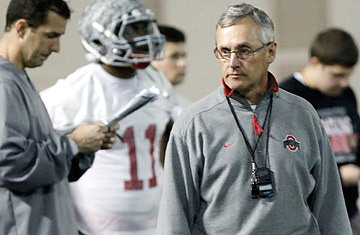
Former Ohio State head coach Jim Tressel, right, walks away as assistant head coach Luke Fickell, left, looks over a list of plays
(2 of 2)
Blatter doles out soccer-development funds to countries, which critics insist buys him influence. His arrogance is legendary. "I am the president of FIFA," he said this week. "You can't question me." Blatter has been leading the organization for 13 years, and soccer observers around the world have been begging for a change.
Instead, despite all the controversy surrounding Blatter, he won re-election this week. Of the 203 ballots cast, 186 were in his favor. England tried to postpone the vote, but that idea was squashed. And where were U.S. soccer officials in all this? They fell in line and failed to speak out against Blatter. The U.S reportedly voted for him. Again sports executives failed to rise to the occasion. (But as Sports Illustrated soccer writer Grant Wahl pointed out in a recent column, the U.S. silence could be strategic. If there's a revote for the 2022 World Cup — the U.S was one of the original host candidates — it could pay to be on Blatter's good side. But is this strategy a sellout?)
Now, as we move toward crunch time in the NBA and NFL labor negotiations, those involved in these talks need to step up as well. Roger Goodell is a fine NFL commissioner, but he hasn't turned in a stellar performance during the NFL lockout. He has pushed for an 18-game schedule, which no one seems to want, and in a disingenuous Wall Street Journal op-ed published in April, he insisted that the players wanted to completely scrap the league's successful business model, which they don't. When a judge lifted the lockout in April, citing — get this — the public interest as a reason for her decision, Goodell and the NFL appealed, further jeopardizing the start of the season. Oral arguments for that appeal, in the 8th Circuit Court of Appeals, were scheduled for June 3.
The leader of the players' union, DeMaurice Smith, isn't blameless for this mess. He and Goodell are dealmakers — so get a deal done. Even Congress, which we tend to consider our most dysfunctional collection of leaders, ultimately cut major deals on health care and the budget.
Before the NBA finals, commissioner David Stern didn't sound confident that his league could avoid a lockout. Of the 30 NBA teams, he says, 22 are losing money. The sport's collective-bargaining agreement expires on June 30 — expect a long summer of lockout news. For its part, the NBA players' union has done some posturing, filing a grievance with the National Labor Relations Board in late May that accused the league of unfair labor practices.
Whatever. And should the NBA be all that upset about spiraling labor costs when its team executives insist on giving $73 million contracts to the likes of journeyman center Erik Dampier? Here's an easy solution for those owners griping about player salaries: don't spend stupidly.
If the NFL and NBA, leagues that are both coming off stellar seasons, miss actual games because of these labor disputes, it will be one of the biggest leadership failures the U.S. has ever seen. If, come next November, neither NBA nor NFL games are being played, there would be a national void, and real economic casualties — for team employees, day-of-game workers, the retail sports stores across the street from the stadium. These leagues are virtual monopolies, tasked with protecting and promoting games that are now a public trust. Secret meetings this week between the NFL's owners and players, plus NBA negotiation sessions planned for next week, are signs of hope.
Hopefully, these so-called leaders won't blow it. The past few months, however, don't exactly inspire confidence.
Gregory is a staff writer at TIME. Keeping Score, his sports column for TIME.com, appears every Friday. Follow him on Twitter at @seanmgregory.
